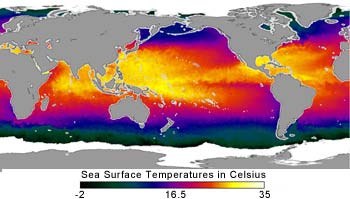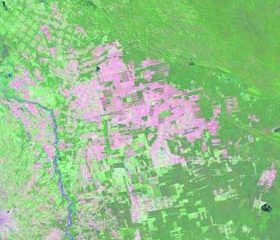Earth Sciences (also referred to as Geosciences), which deals with basic issues surrounding our planet, plays a vital role in the area of energy and raw materials supply.
Earth Sciences comprises subjects such as geology, geography, geological informatics, paleontology, mineralogy, petrography, crystallography, geophysics, geodesy, glaciology, cartography, photogrammetry, meteorology and seismology, early-warning systems, earthquake research and polar research.

NASA’s improved global climate computer model, which simulates and projects how the Earth’s climate may change, indicates that the oceans have been absorbing heat since 1951 and will continue to absorb more heat from the atmosphere over the next 50 years. This increasing ocean heat storage suggests that global surface temperatures may warm less than previous studies projected, while the ocean acts as a bigger heat sponge. Further, such additional ocean heating would likely change regional c

Harry Green comments on a paper in Nature
In a commentary in the Aug. 21 issue of Nature, Harry Green, Distinguished Professor of Geology and Geophysics in the Institute of Geophysics and Planetary Physics and the department of earth sciences at UC Riverside, explains that two large, deep earthquakes (depth > 300 km below the surface of the earth) that occurred in Aug. 2002 in the Tonga subduction zone were causally related.
The Tonga subduction zone is approximately beneath

The core of the earth doesn’t look the way it was expected to. Scientists at the Royal Institute of Technology in Stockholm, Sweden , KTH, can now show that iron, under extremely high pressure, such as that found in the inner earth, takes on unexpected properties, and this can be of importance in understanding the movements of the earth, such as, earthquakes. The results are being presented in the new issue of the British scientific journal Nature.
The core of the earth consists almost excl

What caused the worst mass extinction in Earth’s history 251 million years ago? An asteroid or comet colliding with Earth? A greenhouse effect? Volcanic eruptions in Siberia? Or an entirely different culprit? A Northwestern University chemical engineer believes the culprit may be an enormous explosion of methane (natural gas) erupting from the ocean depths.
In an article published in the September issue of Geology, Gregory Ryskin, associate professor of chemical engineering, suggests t

Researchers see how robots respond in real-world rescue operations with FEMA’s Indiana Task Force 1 An earthquake has just laid waste to a small town. Major roads are impassable, and downed trees have cut power. Worse yet, the local library collapsed during the sudden temblor, trapping a half-dozen patrons. The robots are rushed in to help locate and free the survivors. That was the scenario facing a group of 14 researchers and a crew of search-and-rescue robots as they

While croplands may provide more food than forests, they don’t offer much relief from hot tropical climes, a new study finds.
A study of Santa Cruz, Bolivia, which used NASA satellites and computer models, reports that cutting down tropical forests and converting grasslands to crops may inadvertently warm those local areas. According to the research, forest canopies create wind turbulence that cools the air, and native grasslands are better adapted to the tropics than crops, in ways